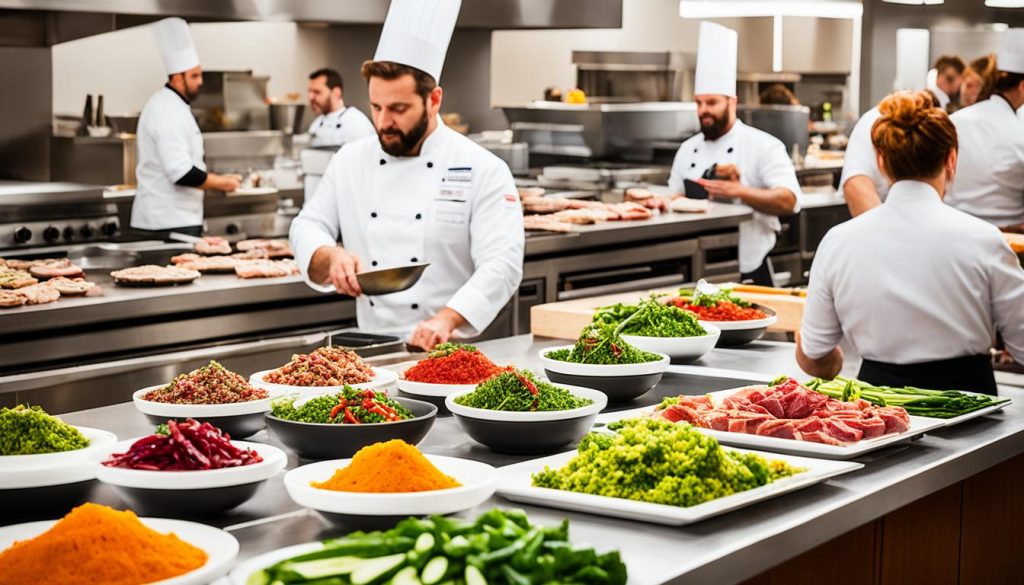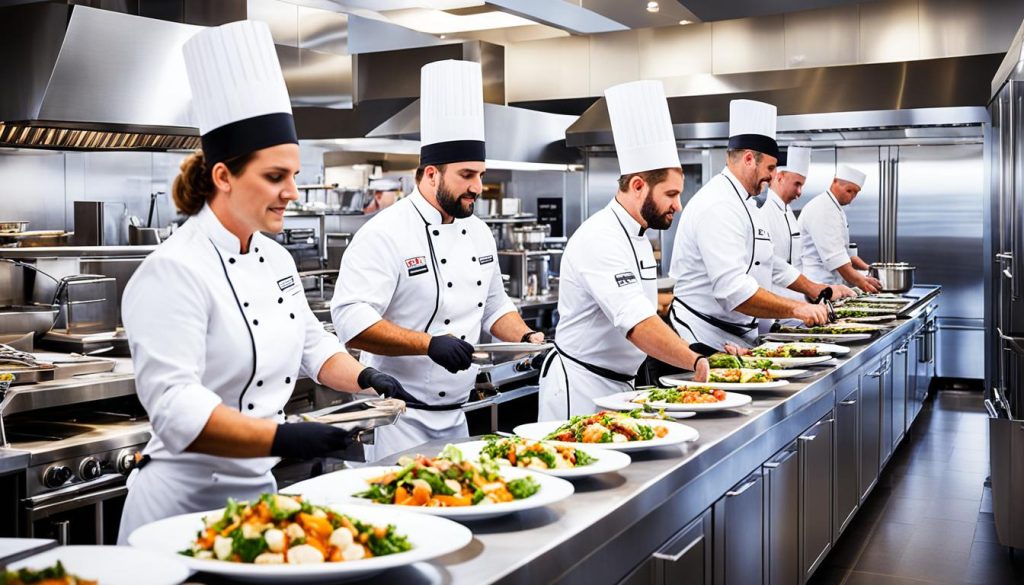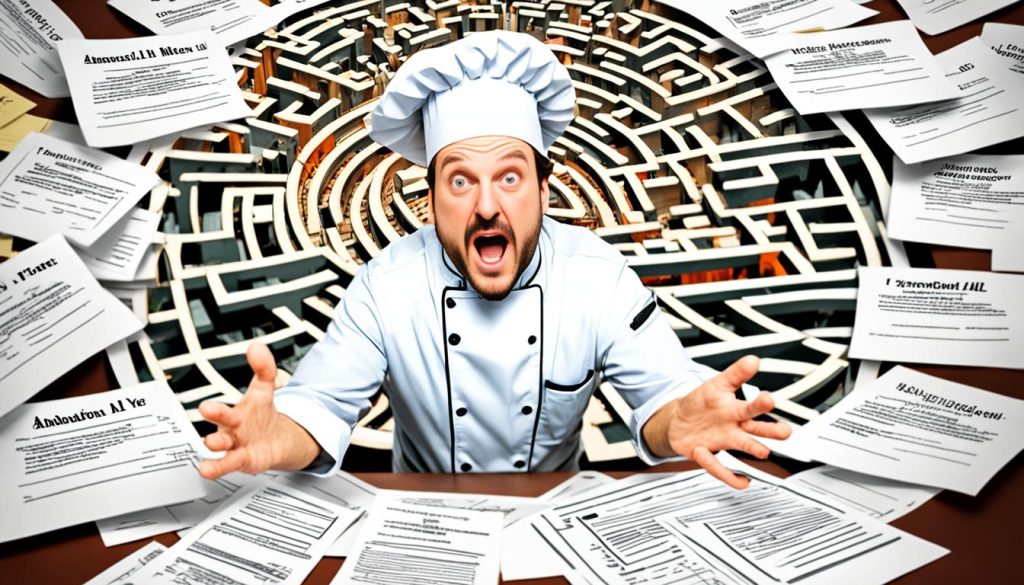Welcome to The Entrepreneur’s Kitchen, your go-to guide for starting a restaurant in the UK. If you’ve ever dreamed of owning your own restaurant and sharing your passion for food with others, this is the perfect place for you. Whether you’re a seasoned chef or a budding entrepreneur, we’ve got all the information you need to turn your restaurant dreams into a reality.
So, if you’re ready to embark on this exciting journey of starting a restaurant in the UK, let’s dive in. We’ll walk you through everything you need to know, from understanding the restaurant industry to completing all the necessary tasks before opening your doors. Trust us, with the right planning and strategies, you’ll be well on your way to creating a thriving dining destination.
Understanding the UK Restaurant Industry
The UK restaurant industry is a vibrant and competitive market, offering a range of options for savvy entrepreneurs looking to enter the restaurant business. To succeed in this industry, understanding its dynamics is crucial. From different types of restaurants to effective management and financial strategies, here’s what you need to know to navigate the UK restaurant industry.
The Types of Restaurants
The UK restaurant industry encompasses a diverse array of establishments catering to various dining preferences. Quick-service restaurants provide fast and convenient meals, making them popular choices for customers on the go. Midscale restaurants offer a balance between affordability and quality, appealing to a broader market. Upscale establishments focus on providing a premium dining experience, targeting customers seeking fine dining and luxury.
Becoming familiar with these different segments will help you determine your niche and understand the market positioning of your restaurant business.
Demographics and Target Market
An essential factor for success in the UK restaurant industry is identifying and catering to your target market. Analyzing demographics, such as age, income, and location, can provide valuable insights into the preferences and dining habits of your potential customers. This information will guide your menu offerings, ambiance, pricing, and overall dining experience to align with the needs and desires of your target audience.
Restaurant Management and Finances
Effective restaurant management is a key component of running a profitable business. It involves overseeing operations, ensuring quality service, managing inventory and supplies, and optimizing workflow. Good management practices also involve staff training and development, maintaining high hygiene standards, and implementing effective marketing strategies to attract and retain customers.
In addition to management skills, sound financial knowledge is vital for running a successful restaurant business. This includes budgeting, cost control, pricing strategies, and financial forecasting. Understanding revenue streams, managing expenses, and monitoring cash flow are crucial for maintaining a financially sustainable operation.
To summarize, a comprehensive understanding of the UK restaurant industry is essential for aspiring restaurateurs. Knowing the various restaurant types, identifying the target market, and possessing strong management and financial skills are key factors for success in this competitive market.

How to Start a Restaurant in the UK?
Opening a restaurant is an exciting venture, but there are several important tasks that need to be completed before you can welcome your first customers. Whether you’re starting from scratch or looking to breathe new life into an existing space, proper planning and preparation are key to a successful launch.
1. Conduct Market Research
Before diving into the world of restaurant ownership, it’s crucial to understand the market you’ll be entering. Research the local competition, analyze consumer trends, and identify any gaps or opportunities in the market. This information will help you develop a clear vision for your restaurant and differentiate yourself from the competition.
2. Develop a Business Plan
A well-crafted business plan is essential for securing funding and guiding your restaurant’s growth. Outline your concept, target market, menu, pricing strategy, marketing plan, and financial projections. A comprehensive business plan demonstrates your commitment and vision to potential investors or lenders.
3. Create a Budget
Estimate the costs involved in opening a restaurant, including lease payments, renovations, equipment, inventory, licenses, permits, and marketing expenses. Developing a detailed budget will help you determine how much funding you’ll need to secure and ensure you’re financially prepared for the challenges ahead.
4. Secure Funding
Explore funding options such as personal savings, bank loans, partnerships, or crowdfunding. If you’re starting a restaurant with no or limited funds, consider alternative financing options, such as small business grants or incubator programs. Keep in mind that securing funding may require a solid business plan and a strong credit profile.
5. Find a Suitable Location
Choosing the right location can make or break your restaurant. Consider factors like foot traffic, parking availability, visibility, and proximity to your target market. Be mindful of lease terms and negotiate favorable terms that align with your long-term goals.
6. Obtain Licenses and Permits
Make sure to obtain all the necessary licenses and permits to operate a restaurant legally. This may include food hygiene certificates, alcohol licenses, health and safety inspections, and more. Research the specific requirements for your location and ensure compliance to avoid any legal issues down the line.
7. Establish a Concept and Menu
Define a unique concept that sets your restaurant apart from the competition. Develop a menu that showcases your culinary expertise and caters to your target market’s preferences. Conduct taste testing and refine your menu to ensure it delivers exceptional dining experiences.
8. Hire and Train Staff
Recruit a skilled and passionate team to bring your restaurant to life. From chefs and servers to bartenders and kitchen staff, hiring the right individuals is essential for maintaining high-quality service. Provide comprehensive training to ensure everyone is aligned with your restaurant’s values and standards.
9. Develop a Marketing and Promotion Strategy
Plan how you’ll attract customers and build awareness for your restaurant. Utilize digital marketing strategies, social media platforms, and local advertising to reach your target audience. Consider offering promotional deals or hosting special events to generate buzz and entice customers to visit your establishment.
By ticking off these essential tasks before opening your doors, you’ll be well-prepared to provide an outstanding dining experience and lay the foundation for a thriving restaurant.

Things to Do Before Opening a Restaurant Checklist: |
|---|
| 1. Conduct market research |
| 2. Develop a comprehensive business plan |
| 3. Create a budget and financial projections |
| 4. Secure funding through various sources |
| 5. Find a suitable location for your restaurant |
| 6. Obtain the necessary licenses and permits |
| 7. Establish a unique concept and menu |
| 8. Hire and train competent staff |
| 9. Develop a comprehensive marketing and promotion strategy |
Legal Requirements and Regulations
When opening a restaurant in the UK, it is crucial to comply with various legal requirements and regulations. Understanding and adhering to these guidelines is essential to ensure the smooth operation of your establishment. Let’s take a look at the key legal considerations:
Licenses and Permits
Obtaining the necessary licenses and permits is a fundamental part of opening a restaurant. Some common licenses and permits include:
- Food Hygiene Certificate: This certificate demonstrates that you meet the required food safety standards and regulations.
- Alcohol License: If you plan to serve alcohol, you will need to obtain an alcohol license. The specific type of license will depend on your business model and the hours during which you intend to serve alcohol.
- Entertainment License: If you plan to provide entertainment, such as live music or performances, you may need an entertainment license.
- Outdoor Seating License: If you plan to have outdoor seating for your restaurant, you may need to obtain a license.
Research and Compliance
It is crucial to conduct thorough research and understand the legal requirements specific to your location and type of restaurant. Each local authority may have its own regulations, so it’s important to familiarize yourself with them. Failing to meet the necessary legal obligations can result in fines, closure, or legal action against your restaurant.
Considerations for Running a Restaurant with Limited Funds
If you are considering opening a restaurant with limited funds, it is still important to meet the legal requirements and obtain the necessary licenses and permits. However, there are a few strategies you can employ to minimize costs:
- Opt for a smaller space or consider a pop-up restaurant concept to reduce rental expenses.
- Simplify your menu to minimize ingredient and inventory costs.
- Consider collaborating with local farmers and suppliers for affordable, fresh ingredients.
- Explore cost-effective marketing strategies, such as social media and local partnerships.
- Efficiently manage your finances and cash flow to ensure sustainability.
By following the legal requirements and exploring cost-effective strategies, you can open a restaurant with limited funds while still maintaining compliance and offering a unique dining experience.

| License/Permit | Cost | Renewal Frequency |
|---|---|---|
| Food Hygiene Certificate | £50-£200 | Every 3-5 years |
| Alcohol License | £100-£1,900 | Annual |
| Entertainment License | Varies depending on local authority | Annual |
| Outdoor Seating License | Varies depending on local authority | Annual |
It’s important to note that the costs and renewal frequencies provided in the table are for reference purposes only and may vary depending on the specific location and circumstances.
By understanding and fulfilling the legal requirements and regulations, you can ensure the legality and success of your restaurant. Remember to research and comply with the specific local authority guidelines and explore cost-effective strategies to open a restaurant even with limited funds.
Conclusion
Starting a restaurant in the UK can be a challenging yet rewarding venture. To increase your chances of success, it is crucial to follow the necessary steps and conduct thorough research and planning. By understanding the UK restaurant industry, completing all the essential tasks before opening, complying with legal requirements and regulations, and developing an effective marketing strategy, you can set up a successful restaurant.
One of the key tips for starting a restaurant in the UK is to have a strong business plan in place. This will help you outline your goals, target market, menu offerings, and financial projections. Additionally, finding the right location and hiring skilled staff who are passionate about food and hospitality can significantly contribute to the success of your restaurant.
Furthermore, it is important to stay informed about the latest food trends and customer preferences, as this will help you stay competitive in the market. Regularly updating your menu and offering unique dining experiences can attract new customers and keep them coming back for more. Remember, setting up a successful restaurant requires dedication, hard work, and continuous learning to stay ahead in the dynamic industry.
FAQs
Do you need a licence to run a restaurant?
Yes, you will need certain licenses and permits to legally operate a restaurant in the UK. This includes a food hygiene certificate and potentially an alcohol license if you plan to serve alcohol. The specific requirements may vary depending on your location and the type of restaurant you are starting.
What qualifications do I need to run a restaurant?
There are no specific qualifications required to run a restaurant in the UK. However, having knowledge and experience in restaurant management, finance, and culinary skills can greatly contribute to your success in the industry.
How much is a food license in the UK?
The cost of a food license in the UK can vary depending on factors such as the local authority and the size of your restaurant. Generally, the cost can range from £100 to £1,500 or more per year.
How can I set up a successful restaurant?
To set up a successful restaurant, it is important to have a strong business plan, understand the local market, find the right location and staff, obtain the necessary permits and licenses, manage inventory and supplies, create appealing menus, and implement effective marketing strategies. It is also important to stay informed about industry trends and continuously adapt and improve your restaurant.
How much does it cost to open a restaurant in the UK?
Opening a restaurant in the UK can be a significant financial commitment, with initial costs ranging from £150,000 to over £1 million. The total expense varies based on factors such as location, size, concept, and the level of renovation required. This investment includes costs for equipment, furnishings, licensing, staffing, and other operational expenses.
Is owning a restaurant profitable in the UK?
Owning a restaurant can be profitable in the UK, but success largely depends on effective management, location, and menu appeal. While some restaurants thrive and generate substantial profits, others may struggle to break even or face losses due to high operational costs and competition in the industry. It’s essential for restaurant owners to maintain a solid business plan and adapt to market trends to enhance profitability.
How much does a restaurant make a year in the UK?
The average annual revenue for a restaurant in the UK typically ranges between £100,000 and £250,000 in total takings. However, actual earnings can vary widely depending on factors such as the restaurant’s type, location, customer base, and operational efficiency. Understanding these variables can help potential owners set realistic financial expectations when entering the restaurant business.





